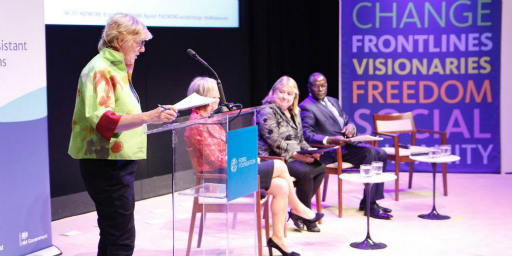15th June 2017 Moscow, Russia
The UK and Russia: making contribution to tackling antimicrobial resistance

Infectious diseases are becoming resistant to the drugs we use to treat them – this is widely known as Antimicrobial resistance (AMR) and is a major global challenge requiring attention by all sectors now. Thanks to the international awareness campaign led by the UK, the international community was mobilised and in September 2016, a landmark declaration on tackling AMR was signed by all UN Member States, including Russia, at a high-level UN meeting in New-York. Russia’s role in addressing Antimicrobial Resistance (AMR) is central due to many factors including the size of the population, the burden of infectious diseases, particularly tuberculosis (TB), and its geopolitical situation. Most importantly, Russia has political will and a strong science base to continue battling AMR and contribute to the global response – as I had a chance to witness during my visit to Moscow in May 2017.
On 17 May I was invited to deliver a keynote lecture at the opening of the International Congress on Antimicrobial Therapy, an annual Moscow-held conference organised by IACMAC, Russia’s leading organisation working on AMR. This event has a long history, having started 20 years ago. It brings practitioners together with discovery scientists in the interests of reducing AMR. I was particularly impressed by the Russian experts who won the clinical case awards and their wide geography representing all regions of Russia. Their work must continue to lead the way in Russia. At the event I also had the opportunity to see a beta version AMR Map which will be used for surveillance in Russia. This is a great step forward and I am delighted that Russian experts are working to translate this web-based surveillance tool into English.
The UK and Russia have a history of collaboration on science and now this collaboration is extending to AMR through the sharing of knowledge and expertise. The British Embassy in Moscow, through the UK Science and Innovation Network in Russia (SIN Russia), is helping to build productive relationships to address AMR. Since December 2015 SIN Russia has hosted two UK-Russia AMR roundtables in Moscow. These have laid the groundwork for collaboration and resulted in a pilot AMR stewardship project in Russian hospitals implemented by the British Society for Antimicrobial Chemotherapy (BSAC). The UK and Russia are equally interacting on international platforms: Russia is represented on the newly formed UN Inter-agency Coordination Group (IACG) by Professor Lyalya Gabbasova, a leading expert on TB and special adviser to the Minister of Health. As part of my role as a Co-Convener of the IACG, I am looking forward to working closely with Professor Gabbasova over the coming years.
Drug-resistant TB is another issue which needs consistent international efforts. I am delighted that Russia will host the first WHO Global Ministerial Conference on TB in the context of Global Health and the SDGs in Moscow in mid-November 2017. A recent study published in The Lancet Infectious Diseases has predicted that drug-resistant TB will rise over the next two decades. Nearly 40% of the world’s drug-resistant Mycobacterium tuberculosis infections already occur in India, Russia, South Africa, and the Philippines; and by 2040 MDR strains will become more common in each of those countries. This is a big cause for concern globally, and one that calls for increased action on now.
2017 is the UK-Russia Year of Science and Education, and AMR work is one of the facets of our bilateral scientific engagement. The Year has already helped to strengthen links between our two expert communities and will deepen links further through exchanges between practitioners, researchers and public health officials. On my recent visit meetings with Russia’s Health Minister, Veronika Skvortsova and representatives of Russia’s leading pharma companies provided a useful insight into how we could make progress along this route to encourage innovation and ensure access to quality medication for all who need them.

This is a really great effort. I hope that UK and Russia will find some cure soon. I come from India and Antimicrobial Resistance is a big threat here. But developed countries like UK and Russia are doing great work to tackle this problem. Thanks for the wonderful info and keep us updated, please.
Very good attempt and appreciate. This will help people to be united.